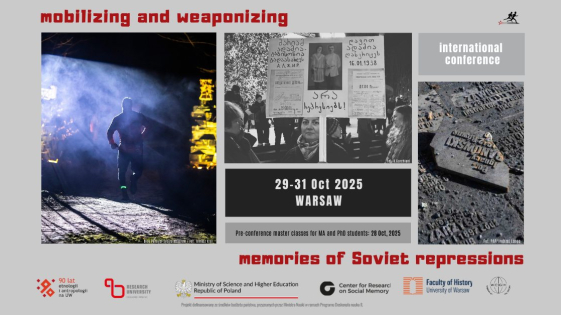Call for Papers: Mobilizing and Weaponizing Memories of Soviet Repressions
Zapraszamy do udziału w międzynarodowej konferencji "Mobilizing and Weaponizing Memories of Soviet Repressions", która odbędzie się w Warszawie 29-31 października 2025.

![]() call_for_papers_mobilizing_conference.pdf
call_for_papers_mobilizing_conference.pdf
The memory of Soviet repressions is entering a new and critical phase. The full-scale Russian invasion of Ukraine, the banning of International Memorial in Russia, the renewed closure of Russian archives, the intensifying politicization of history and memory, and the resurgence of traumatic recollections triggered by war and shifting geopolitical dynamics have profoundly reshaped memory landscapes in many societies affected by Soviet repressions. These developments not only disrupt existing narratives but also call for fresh scholarly approaches to understanding how Soviet repressions are remembered, contested, and instrumentalized today. In this context, establishing a common platform for scholars working on these issues is more urgent than ever.
The memory of Soviet repressions is far from monolithic. It is fragmented, multi-layered, and entangled with other historical traumas unique to each society that experienced them. These entanglements—shaped by national, regional, and cultural specificities—render the memory of Soviet repression a complex and elusive phenomenon. What unites the various forms that Soviet repression took across two continents, within such different societies and cultures, besides the fact that they happened under Soviet leadership? Russia's war against Ukraine has further complicated this memoryscape, as it mobilizes and reshapes the memory of Soviet repressions in different ways across various societies.
This conference seeks to explore these diverse vernacular articulations of Soviet repression memory, both in the former Soviet republics and in countries that once lay within the Soviet sphere of influence. A central focus will be on how local memories have interacted with broader frameworks—ex. the “cosmopolitan” memory of the Gulag, shaped by the Memorial Society—and how Russia’s war against Ukraine is disrupting or reshaping that legacy. The conference will also address the role of a wide array of actors—governments, civil society, religious institutions, and grassroots movements—in shaping, preserving, or contesting these memories, and how these processes play out across a spectrum of political and ideological contexts.
We will also examine how memories of Soviet repressions are being transformed and mobilized in contemporary processes of decolonization and disengagement from Russian influence. A striking example is found in the recent political protests in Georgia, where some demonstrators marched with signs bearing the names of ancestors who were repressed by the Soviets—reclaiming personal and collective memory as an act of resistance. At the same time, the conference will explore how these memories have been instrumentalized in political and cultural battles, underscoring their potent role in ongoing struggles over history, identity, and geopolitical alignment.
The conference has evolved from the project “Memories of Soviet Repressions in Post-Multi-Colonial Post-Soviet Spaces”, hosted by the Institute of Ethnology and Cultural Anthropology at the University of Warsaw.
Submissions may be related, but are not restricted, to the following topics:
- What roles do memories of Soviet repressions play in political, social, and cultural transformations of societies that were affected by Soviet repressions, particularly in the context of ongoing geopolitical shifts and war?
- How do political, institutional, and grassroots actors, including state organs, NGOs, and transnational organizations, shape memory cultures and influence remembrance processes?
- How are perpetrators, collaborators, and implicated subjects of Soviet repressions portrayed in various societies that passed through the repressions?
- What new theoretical perspectives and conceptual tools are needed to more effectively capture the specific dynamics and significance of memory of Soviet repressions?
- Comparative perspectives on remembrance practices and commemorative cultures across different societies that experienced Soviet repressions, examining their similarities, differences, and interactions.
- In-depth case studies of specific memory practices and sites that illustrate how Soviet repressions are remembered, reinterpreted, or contested in various local and transnational contexts.
Pre-conference Master Classes (October 28, 2025)
This one-day intensive masterclass is designed for master's and doctoral students and it aims to foster collective reflection on the shape and future direction of research on Soviet repressions. Students will present their work before peers and faculty, receiving detailed feedback from experts. Participants in the masterclass will also take part in the conference and all related events, making the masterclass and conference a crucial platform for dialogue, collaboration, and the academic development of young researchers.
Conference organization information
Language: English
To attend the conference
Please send your abstract of no more than 300 words together with a short biographical statement by May 31, 2025. Abstracts will be selected by the academic committee. We will notify you about the acceptance of your proposal by June 15, 2025. Conference participation is free of charge. The organizers provide accommodation in Warsaw, but the participants have to cover the travel expenses by themselves.
To attend the pre-conference masterclasses
Please send your extended abstract of 600 words together with a short biographical statement by May 31, 2025. Abstracts will be selected by the academic committee. We will notify you about the acceptance of your proposal by June 15, 2025. You will be expected to send your final papers by September 30, 2025. The masterclasses will only take place in person. Organizers will cover travel expenses and accommodation in a hostel in Warsaw for the duration of the conference.
Please submit your abstract and a biographical statement here: ONLINE APPLICATION
Conference Convenors
Zuzanna Bogumił, PhD. (Institute of Ethnology and Cultural Anthropology, UW)
Margaret Comer, PhD. (Institute of Ethnology and Cultural Anthropology, UW)
Academic Council of the conference
Ketvan Gurchiani, Prof. (Ilia State University, Georgia)
Iwona Kaliszewska, PhD. (Institute of Ethnology and Cultural Anthropology, UW)
Shugyla Kilybayeva, PhD. ( Al-Farabi Kazakh National University)
Raili Nugin, PhD. (Tallinn University, Estonia)
Andriy Fert, PhD. (Kyiv School of Economics, Ukraine)
Projekt dofinansowanyze środkówbudżetu państwa, przyznanych przezMinistra Naukiwramach Programu Doskonała nauka II.


